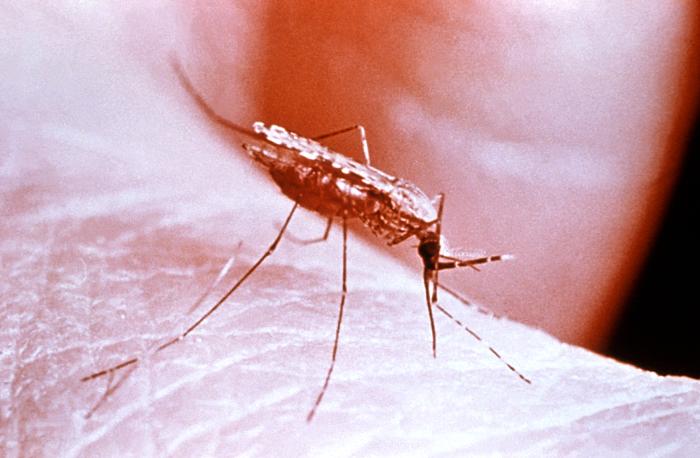By NewsDesk @infectiousdiseasenews
The Public Health Center (PHC) of Ukraine reports (computer translated) in early May, a 43-year-old man was diagnosed with malaria in Odessa. For the past five months, the patient has been the captain of a seagoing ship (gas carrier) that transported to the ports of Angola.

Image/CDC
The man was hospitalized in a private medical institution on the sixth day after the onset of symptoms – fever up to 39 ° C, chills, sweating, weakness, headache. Prior to that, the man was taking antipyretic drugs.
The next day after hospitalization due to the deterioration of the patient was transferred to the intensive care unit of the city infectious diseases hospital. Malaria was confirmed in the laboratory. The patient undergoes specific treatment according to the scheme and detoxification therapy.
There is no information on chemoprophylaxis against malaria during the flight. A request has been sent to the crewing company. The epidemiological investigation continues.
One imported case of malaria was fatal. A 31-year-old man from Odessa region died. For the past six months, he has worked as a cook on board a seagoing ship sailing to Africa (Senegal, Côte d’Ivoire, Congo).
During the epidemiological investigation, it became clear that the man did not receive antimalarial drugs during the flight.
At the request of the Laboratory Center of the Ministry of Health for water transport, it became known that six sailors – citizens of Ukraine – were on the same vessel, and all of them returned to Ukraine at the same time. Thus, it turned out that two more of them became ill with malaria and were hospitalized in medical institutions in Kherson and Mykolayiv.
In particular, according to the Kherson Lab Center, the patient sought medical help on the seventh day of illness only after a telephone conversation with colleagues on the ship , when he learned that two of them had malaria and one died. The man was hospitalized in serious condition. The diagnosis was confirmed in the laboratory and specific treatment was prescribed.
Another sailor, a member of the crew, was sent for examination. The two have not been contacted so far.
According to surveys, chemoprophylaxis against malaria was not performed during the flight. A request was sent to the shipowner for chemoprophylaxis.
Also at the end of April in Kherson a case of imported tropical malaria was registered in a 35-year-old man who worked as a senior assistant captain on a ship transporting containers from Georgia to Africa (Benin, Cameroon, Zaire, Namibia, Nigeria) and Asia. Lanka, Singapore).
The epidemiological investigation established that the patient underwent a medical commission and instruction on malaria prevention. However, he did not take preventive treatment against malaria.
The Center for Public Health has sent a request to the Ministry of Health’s Laboratory Center for Water Transport regarding the availability of anti-malarial drugs on board ships for all crew members and the possibility of obtaining them under the scheme during stays in malaria-endemic countries.
It will be recalled that malaria is a life-threatening disease transmitted through mosquito bites. Malaria can be prevented and treated. To prevent the disease you need to take antimalarial drugs or chemoprophylaxis. To do this, consult a doctor in advance, because chemoprophylaxis depends on the country where you travel, and it should be started a few weeks before the trip.
Also, to protect against the disease, you need to prevent mosquito bites. For this:
- wear clothes that cover the body as much as possible;
- use repellents – insect repellents, including mosquitoes;
- stay in areas where mosquito nets treated with a long-acting insecticide are installed.
Malaria transmission occurs in 87 countries , mostly in Africa, Asia, South and North America. In Ukraine, all registered cases of diseases are imported.
Symptoms of malaria appear 10-15 days after the bite of an infected mosquito. The first symptoms – fever, headache – may be mild, making it difficult to detect malaria.
If you experience flu or fever while traveling or within a year of returning from a country where malaria is transmitted, see your doctor immediately and report your travel history.
Treatment should be started within the first 24 hours after the onset of symptoms, otherwise malaria can develop into a serious illness and end in death.
- Malaysia officials respond to ivermectin ‘miracle drug’ claims
- Hispaniola: Diphtheria cases rise to 23 confirmed
- Paraguay: Dengue cases on the rise
- Plague suspected in the death of squirrels in the Colorado Springs area
- CDC study: COVID-19 mRNA vaccines 94% effective in health workers
- FDA releases report to shed light on 2020 salmonella outbreak linked to red onions
- Philippines Agriculture Dept. backs proclamation of state of calamity due to ASF outbreak
- CDC: All travelers to Pakistan are at risk of getting XDR typhoid fever

